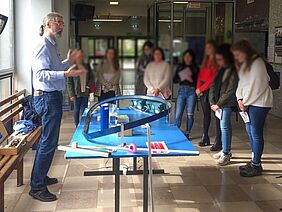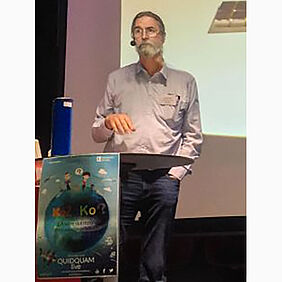Portrait of Philippe Verkerk by Unisciel.
Atomes froids Vie du labo
"One could say that, like Obelix, he fell into when he was little. From two research parents at CERN, he soon discovers the inspiring laboratories of the largest particle physics center in the world, in Geneva, and quickly integrates research as a life project in its own right. A reason for being that leads him from the preparatory class to the Ecole Normale Supérieure, before joining the CNRS in 1986. First settled in Paris, he moved to Lille in 1997, where he still resides and joined the PhLAM laboratory (Physics of Lasers, Atoms and Molecules).
Sharing on duty certainly, but in love too.
When Mr. Verkerk is questioned about his report to scientific mediation, he simply answers an obligation to satisfy society. Since it pays him to do his research, he owes him the sharing of his knowledge and his discoveries. Sharing on duty certainly, but in love too. According to him, the general public does not measure enough the importance of physics: few people, for example, are aware of their daily use of laser technology. Popularize. Make understand. Amuse.
If society does not push young people to go to science, it tries to inspire vocations by hosting every year college students during discovery courses. He hopes to make more "sexy" an area that national education addresses only from a technical point of view, with big reinforcement of manipulation and modeling. It’s about showing physics differently than what they see in class. The visual predominate, the word too. Popularize. Make understand. Amuse. Participating in scientific culture events has become a habit for him. In 1992, Science en Fête is born to make known to all the French the world of the research. Almost thirty years later, the event, which changed its name to Science Festival, still exists and mobilizes more and more participants. Philippe Verkerk is present this every year. Member and host of the association Physifolies, with his colleague and office neighbor Daniel Hennequin, also a physicist and popularizer, THE DAD of our series Kézako, he educates young and old to the beauty of science. To arouse astonishment, as if to perpetuate one’s childhood enthusiasm in the face of discovery. Because it is also, and above all, the life of a scientist. To advance knowledge through a fervent investment of candor and malice. Show everyone what’s going on in the labs. Mr. Verkerk likes to show everyone what’s going on in the labs. He also enjoys exchanges with Lille students he meets at university. According to him, they represent the living force of research because they are the ones who run the manipulations: although they do not yet have the capacity for discernment and analysis of data, discussions on the results that ’s follow may be fruitful. Within PhLAM, his research focuses on the dynamics of cold atoms. A gas (like air for example) consists of atoms or molecules that move in all directions. Their temperature and average speed are related: for example, at room temperature, their average speed is 300m / s. Thanks to lasers, we can reduce this speed until we reach temperatures close to absolute zero (-273 ° C) to a few thousandths or millionths of a degree, much colder than anything else. And under these conditions, atoms do not behave as at room temperature: it is on this "dynamic" that Philippe Verkerk works. Philippe Verkerk. A passionate fascinating.
The word passion here is perhaps not the most appropriate because if Mr. Verkerk is hungry for Science, he is also for Latin. We will therefore raise the root of the word passion, passio, formed on the past participle of the verb patior which means "to suffer". His Latinist wife conveyed to him the taste for this dead language, which is still very much alive since it is still used in the formation of neologisms. With Yves Ouvrard, retired Latin teacher and creator of the Collatinus program, he brought the application Collatinus, a lemmatizer and morphological analyzer of Latin texts, on the website of the Equipex Biblissima. So that the enthusiasts of Plato are not left behind, he created the application Eulexis, the Greek version of Collatinus. He devotes himself to perfecting these programs during his free time. However, he must not remain much free time... The team Unisciel thank him for allotted time to answer the questions in this portrait. Philippe Verkerk’s dictionary :
Science : solve the riddles of nature and respond in a reliable and reproducible way to the questions that arise. Research : pick up where curiosity takes us. A collection of harmlesses discoveries that make great constructions. It is yesterday’s research that makes today’s technology, and today’s that forges the world of tomorrow." Article of Carole Labie Communication officer at Unisciel,
with the kind participation of Daniel Hennequin CNRS Researcher at PhLAM. View online : http://www.unisciel.fr/2018/06/12/p...
When Mr. Verkerk is questioned about his report to scientific mediation, he simply answers an obligation to satisfy society. Since it pays him to do his research, he owes him the sharing of his knowledge and his discoveries. Sharing on duty certainly, but in love too. According to him, the general public does not measure enough the importance of physics: few people, for example, are aware of their daily use of laser technology. Popularize. Make understand. Amuse.
If society does not push young people to go to science, it tries to inspire vocations by hosting every year college students during discovery courses. He hopes to make more "sexy" an area that national education addresses only from a technical point of view, with big reinforcement of manipulation and modeling. It’s about showing physics differently than what they see in class. The visual predominate, the word too. Popularize. Make understand. Amuse. Participating in scientific culture events has become a habit for him. In 1992, Science en Fête is born to make known to all the French the world of the research. Almost thirty years later, the event, which changed its name to Science Festival, still exists and mobilizes more and more participants. Philippe Verkerk is present this every year. Member and host of the association Physifolies, with his colleague and office neighbor Daniel Hennequin, also a physicist and popularizer, THE DAD of our series Kézako, he educates young and old to the beauty of science. To arouse astonishment, as if to perpetuate one’s childhood enthusiasm in the face of discovery. Because it is also, and above all, the life of a scientist. To advance knowledge through a fervent investment of candor and malice. Show everyone what’s going on in the labs. Mr. Verkerk likes to show everyone what’s going on in the labs. He also enjoys exchanges with Lille students he meets at university. According to him, they represent the living force of research because they are the ones who run the manipulations: although they do not yet have the capacity for discernment and analysis of data, discussions on the results that ’s follow may be fruitful. Within PhLAM, his research focuses on the dynamics of cold atoms. A gas (like air for example) consists of atoms or molecules that move in all directions. Their temperature and average speed are related: for example, at room temperature, their average speed is 300m / s. Thanks to lasers, we can reduce this speed until we reach temperatures close to absolute zero (-273 ° C) to a few thousandths or millionths of a degree, much colder than anything else. And under these conditions, atoms do not behave as at room temperature: it is on this "dynamic" that Philippe Verkerk works. Philippe Verkerk. A passionate fascinating.
The word passion here is perhaps not the most appropriate because if Mr. Verkerk is hungry for Science, he is also for Latin. We will therefore raise the root of the word passion, passio, formed on the past participle of the verb patior which means "to suffer". His Latinist wife conveyed to him the taste for this dead language, which is still very much alive since it is still used in the formation of neologisms. With Yves Ouvrard, retired Latin teacher and creator of the Collatinus program, he brought the application Collatinus, a lemmatizer and morphological analyzer of Latin texts, on the website of the Equipex Biblissima. So that the enthusiasts of Plato are not left behind, he created the application Eulexis, the Greek version of Collatinus. He devotes himself to perfecting these programs during his free time. However, he must not remain much free time... The team Unisciel thank him for allotted time to answer the questions in this portrait. Philippe Verkerk’s dictionary :
Science : solve the riddles of nature and respond in a reliable and reproducible way to the questions that arise. Research : pick up where curiosity takes us. A collection of harmlesses discoveries that make great constructions. It is yesterday’s research that makes today’s technology, and today’s that forges the world of tomorrow." Article of Carole Labie Communication officer at Unisciel,
with the kind participation of Daniel Hennequin CNRS Researcher at PhLAM. View online : http://www.unisciel.fr/2018/06/12/p...


